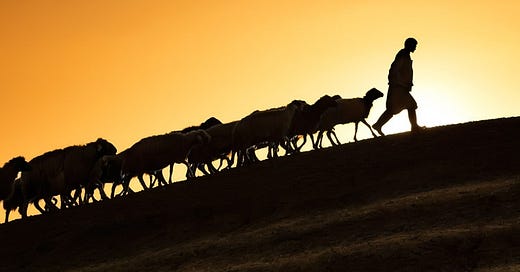Part One: Sheep, Shepherds and Sheepdogs
Who are we in the flock of God? How do we lead, follow, protect, and stand firm—especially in a world that often blurs the lines between right and wrong? This two-part message will explore these roles, as identity labels in today’s world, and as metaphors in biblical teaching.
We’ll draw from voices old and not so old—Scripture first, then teachers like Calvin, Spurgeon, and Creasy among others. There will be moments of humor, some controversy, and hopefully, something to help us see it all a bit differently. Let’s take a quick look at how the meaning of these identities has evolved.
When Jesus compares us to sheep, He isn’t paying us a compliment. Sheep are nervous, clueless, and constantly in need of help. In his extended Bible study courses, William Creasy liked to say that the Lord wasn’t flattering us—He was being honest. It’s a humorous image, but it carries deep truth: being called a sheep is less about identity and more about reality. We need our Shepherd.
Today, the word sheep has been redefined. In modern culture, it’s shorthand for blind followers, people who can’t think for themselves. Sheeple. The insult is common in political arguments and ideological debates. But Scripture uses the image very differently. What the world mocks, God claims. The Bible doesn’t describe sheep to shame us. It does so to show us how deeply we need—and are loved by—our Shepherd.
Now, I'm not going to try to make sheep look good. It’s about understanding our place in God’s design. Weakness isn’t the point. Belonging is.
Keep reading with a 7-day free trial
Subscribe to Christian Soldier 21 to keep reading this post and get 7 days of free access to the full post archives.




